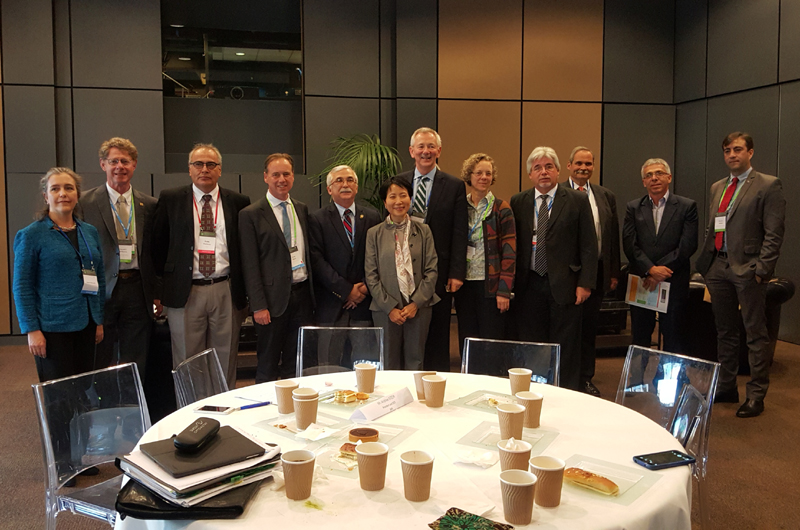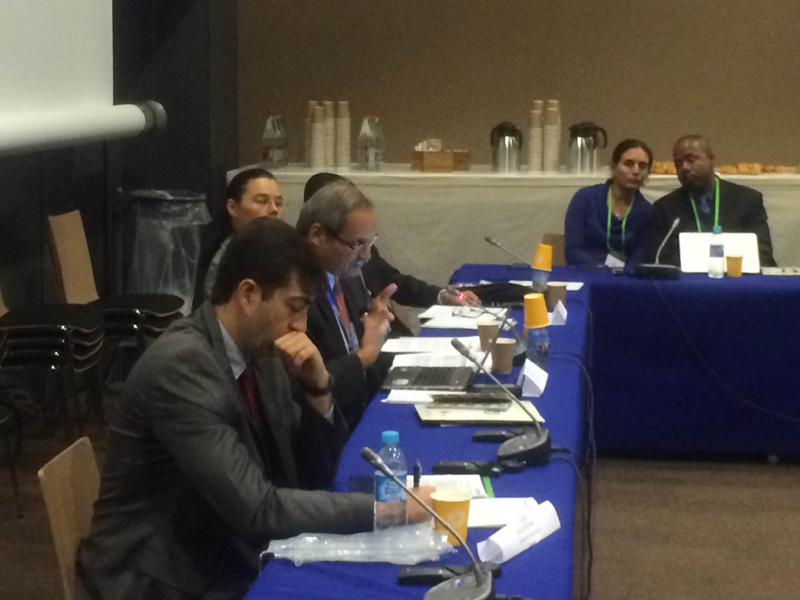Held within the framework of COP21, an exchange of ideas was carried out to encourage the sectors to join efforts in facing the challenges of climate change.

San José, Costa Rica, 15 December 2015 (IICA). A high-level dialogue organized by the Inter-American Institute for Cooperation on Agriculture (IICA), together with the Center for International Forestry Research (CIFOR), focused on identifying synergies and building concrete actions between the agricultural and environmental sectors in order to face the challenge of adapting to and mitigating climate change.
The event took place during the twenty-first session of the Conference of the Parties (COP21) of the United Nations Framework Convention on Climate Change (UNFCCC), held in Paris, France, from November 30 to December 11.
Participants in the discussion included the ministers of agriculture of Costa Rica, Guatemala and Paraguay; the deputy ministers of Belize, Panama and Paraguay; the Minister of Planning of Nicaragua; the Ambassador of Nicaragua in France; and official representatives of CIFOR, the U.S. Department of State and the Economic Commission for Latin America and the Caribbean (ECLAC).
The Executive Secretariat of the Central American Agricultural Council (SECAC) and the Executive Secretariat of the Central American Commission for Environment and Development (SECCAD) also participated in the dialogue.
The dialogue provided an opportunity to exchange purposeful ideas and also exemplified the agricultural sector’s growing role in international negotiations on climate change. The ministers discussed ways to achieve cross-sectoral coordination, combine efforts with regard to the Intended Nationally Determined Contributions (INDCs), and generate institutional and regulatory frameworks for facing climate change while also achieving the region’s developmental goals.
“Cross-sectoral activity must be carried out a broad and profound discussion on the juncture between agriculture and the environment held. An international commitment to reducing the agricultural sector’s greenhouse gas emissions must be made based on each country’s food production possibilities and thus allow for the development of national economies,” stated the Minister of Agriculture of Uruguay, Tabaré Aguerre.

Manuel Jiménez, SECAC specialist, agreed with Aguerre, and stressed that efforts must be redoubled, given the undeniable fact that climate change is no longer an expectation, and that its effects are already being felt across the region in the form of increased climatic variability.
“The El Niño phenomenon, recognized as a preview to what climate change has in store for us, is manifesting itself once again like it did between 1997 and 1998. In a partial analysis of four of the eight countries in the Central American Integration System (SICA), the World Food Program reported that during the first few months of its presence, the phenomenon had affected 3.3 million people and 1.6 million people were food insecure,” stated Jiménez.
High-level roundtable
In addition, as part of the activities parallel to COP21, IICA and CIFOR organized a ministerial roundtable in which Latin American ministers were able to discuss the challenges faced by their countries with global leaders on topics such as cooperation and funding in relation to climate change and the environment.
The Executive Director of the Global Environment Facility (GEF), Naoko Ishii; the Executive Director of the United Nations Environment Program (UNEP), Achim Steiner; the Senior Director of the Environment and Natural Resources of the World Bank, Paula Caballero; and the CEO of the World Resources Institute (WRI), Andrew Steer, among others, also participated in this high-level dialogue.
“Our participation at COP21 was positive. With a view to benefiting its member countries, IICA has been creating opportunities to raise the sector’s profile in global discussions, emphasizing the contributions the agricultural sector can make in Latin America by reducing emissions and using natural resources efficiently and responsibly. This involves a diversified, resilient agriculture that is better adapted to future climatic conditions,” concluded David Williams, Principal Specialist for Resilience and Comprehensive Risk Management in Agriculture for IICA.
More information: david.williams@iica.int.











